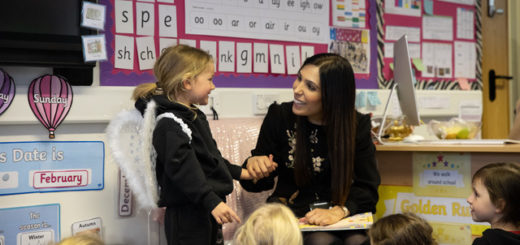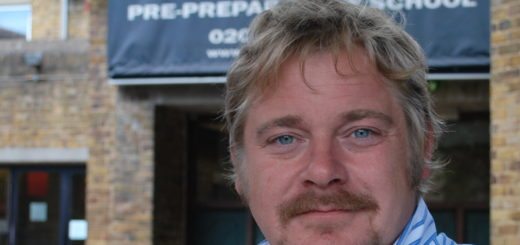Schools for children with special educational needs
Abingdon House School
Website: http://www.abingdonhouseschool.co.uk/
Head teacher: Mr Roy English
Admission: It is important to note that the school does not require a Statement nor does it require an Educational Health Care Plan for purposes of admission. Suitability of a child for admission is based on a multi-disciplinary assessment conducted over one or two days. This also included informal session time with the Head teacher, therapists, specialist teachers and even a classroom sitting. Children are admitted on the basis that not only would they benefit from the educational structure and resources the school has to offer but also on the basis that they would not disrupt the education of the other children who are already there.
About the school: Abingdon House School is a place where children with unique needs are provided with a bespoke education which serves to develop the unique needs and talents of each child. The school works closely with a team of gifted and talented Teachers, Speech & Language Therapists, Occupational Therapists, Physiotherapists, Music Therapist and Teaching Assistants who all work together to deliver multi-sensory lessons. The lessons are taught using traditional teaching methods which are integrated with the latest technological advances in educational hardware and software to enhance the learning environment. The school addresses the specific learning difficulties of each child and strives to help such children re-enter mainstream schools. Working closely with parents, Abingdon is a much loved and very well regarded school. The school also has a home-school diary which is used to keep the parents updated about the events, activities and progress of each child. Parents can also meet the Head at drop off and pick up to discuss the day. Some teachers also contact parents via a blog. The environment is warm, encouraging and friendly and has a routine which incorporates physical and creative education alongside academic and social development.
As one parent put it,
“Abingdon House School has made all the difference to my son with his progress and development. He has similar peers and they gain positive experiences from each other. The bespoke teaching and therapies are wonderful and small class sizes make all the difference. If you have a child like my son who does not fit the ‘mould’ and would not be well placed in mainstream or other special schools where children are not as communicative, then this school is ideal. The children have good cognitive ability and are able to learn – they just have sensory processing, dyslexia, dyspraxia, high functioning autism and other spiky cognitive profiles. I am so happy the school is now extending its teaching to age 16-18 and incorporating GCSE, BTEC and ASDAN exams when the children are older and able to sit them. Finding the school when my son was 6 has changed him in so many ways for the better – he socialises and reads, writes and has found a real love of maths. I highly commend this school and the staff’s dedication to the pupils and parents.” – Mrs AS
Blossom House
Website: https://www.blossomhouseschool.co.uk/
Head teacher: Joanna Burgess
Admission: The school has two settings. The Lower School is in Euston and the Upper School in New Malden.
Children are accepted at Blossom House only after careful assessment, to ensure that the school is able to provide the right level of support. The primary needs supported are speech, language and communication needs. However, approximately half of the children and young adults have been diagnosed as being on the autism spectrum. This is taken into consideration during the initial assessment process and when a pupil is placed at the school, through planning, teaching, therapeutic input and behaviour management. The school will be an appropriate and successful placement if the pupil is able to cope with the following:
Learning within a small group setting and being able to process both academic instruction and social information at the same time
Coping with frequent transitions between classrooms
Coping with changes of staff for different lessons
Coping with changes to the school day eg trips and events
Coping with additional pupils joining a class
Coping with environmental stressors eg noise, heat, movement
The initial enquiry is made either by the parents or the Local Authorities, whether on the parents’ or their own behalf. A child does not need to have a Statement of Educational Needs before being assessed by the school. Some year groups are very oversubscribed and so places will only be held open for six months. The school would need to be assured that Local Authority (or private) funding will be available prior to an offer being made.
There is an assessment fee of £250 if your child is offered a place and you choose not to take it up. This fee reflects the detailed assessment process, which includes input over 3 days by several members of staff and the therapist’s written report.
3 open days per year are organised during which parents can visit the school and meet the Principal. These would be appropriate for parents who are not looking for an immediate place for their child.
Initial Assessments
For parents who are looking for a place more quickly, we have a 2-stage assessment. The Initial Assessments (45 minutes) usually take place on Wednesday afternoons, and are an opportunity for parents to see around the school and discuss their child and their concerns with Joanna Burgess, while one of the Speech and Language Therapists spends time with the child. This is an informal session (playing games or talking) and not a formal assessment.If the school feels they can offer the right support/provision, the child will be invited back for a 3 – 5 day assessment.
3 – 5 day assessments
The child will spend 3 – 5 consecutive days with other children who are his/her age group, from 8.45am to 3.00pm. During this time there will be a formal SLT assessment as well as more informal observation of the child in lessons and around the school. The impact of the child on the current group dynamics is also taken into account. A decision will be made on whether the school can meet the needs of the child, and an offer of a place will be made, and a full report sent to the parents. Occasionally the child may be asked to come for a longer assessment period.
Fairly House
Website: http://www.fairleyhouse.org.uk/
Head teacher: Mr Michael Taylor
Admission: The school does not accept children with social, emotional or behavioural difficulties including hyperactivity related to ADHD. The school also does not accept children who are on the autistic spectrum. The majority of children are dyspraxic or dyslexic and have difficulties with literacy or numeracy. The first step in the admissions process is to telephone the registrar and arrange a guided tour followed by a meeting with an educational psychologist. The child will then be invited to spend two days at the school where a multidisciplinary assessment will be conducted and the child can sit in on classroom and playground activities. Parents will then be called into a meeting during which the results of the assessment will be discussed and the school will outline how they can help. Specialist therapists can supply reports for a fee if so wished. If a place becomes available, parents are then asked to send in a completed application form and a deposit.
About the school: Fairly House prides itself on providing a level playing field for children who may feel discouraged or lost self esteem in a main stream school either because they have to be withdrawn to be given extra help or because they cannot keep up with their peers in reading or writing. The school aims to encourage and help boost their self confidence both by helping them understand that there are others with similar difficulties and also by compiling a programme of study that is a combination of individualised teaching methods, specialised therapy and insightful assessments. Many children are able to return to main stream schools in a few years.
The Moat
Website: http://www.moatschool.org.uk/
Head teacher: Ms. Clare King
Admission: Parents or representatives are invited to visit the school after an initial enquiry to meet with the Headteacher, with or without their child , to discuss the pupil’s educational history, cognitive profile and what provisions can be offered by the school. All paperwork relating to the child should be submitted including a current Educational Psychologist’s report that is not more than two years old and any additional educational and diagnostic information. The paperwork is then examined by members of the Admissions Committee, (SaLT, Deputy, Head’s PA and SENCo), and if needed, the school may request further information and confirmation of any reports submitted, at any stage of the process. The child may then be invited for an ‘Acquaint Day’ at which point he/she can join a teaching group and participate in at least one school day. The class teachers will set a number of tasks to determine the child’s current level of ability in a variety of subjects that includes Mathematics and English (including literacy). The aim of the assessment is to gain a greater understanding of the child’s social skills and the potential they have to progress in the educational setting provided at The Moat. All the information from this visit and the paperwork provided will form the basis of the discussion as to whether the school can meet the child’s educational needs. Finally, a letter confirming acceptance or expressing the school’s inability to provide a suitable educational setting is written by the Headmistress and sent to the child’s parents.
About the school: The school describes itself as being “mainstream in structure but specialist by nature”. It accepts children with Specific Learning Difficulties, ADD, dyslexia, dyspraxia and a variety of other educational challenges. The children are taught the national curriculum and helped to gain confidence and achieve success both personally and in public examinations. The school also prides itself on being able to identify and nurture the different talents and creativity displayed by its students. The aim of the school is to help students bridge the gap between their learning potential and their performance and to further this aim, the school not only sets out individual timetables that cater to specific needs but also ensures that each child receives the support they need within small groups. The school also has its own team of specialist therapists to hand and offers its students a wide range of extra curricular activities.
International Community School (ICS)
Website: http://www.icschool.co.uk/
Head teacher: Ms. Rose Threlfall
Admission: The school recommends that parents and pupils visit the school prior to registration but this is not compulsory. In order to start, parents are advised to send in a completed application form along with the application/Special Education Needs (SEN) fee. A visit will be recommended to meet with the admissions department. Parents are asked to discuss their child’s special requirements with the Admissions Office at the first opportunity so that the school can reflect on the school’s capacity to support the child. During the admissions process the school will discuss any adjustments that can be reasonably made for the child on joining with the parents.Prior school reports, teacher references and an applicant questionnaire and any additional reports, including a recent Educational Psychologist’s Evaluation is required. Once an application is complete and the requested documentation received, the Admissions Office will review the application. The review process usually takes 3-5 days, although this may be extended if the Admissions Team are required to complete any necessary follow-ups, e.g. seeking further school reports, inviting the student in for a trial day, etc. The decision will be conveyed to the family via email. For children who need SEN support, the school’s offer of a place will outline the proposed provision for the first term. If a place is offered, the family will have 7-10 working days to accept the place by the completing the acceptance pack and submitting the deposit.
About the school: ICS is accredited by the National Autistic Society of Britain and has created specific programmes for students who are not able to access mainstream schools. The programmes are divided as follows:
The Primary Years Special Education (PYSE) programme provides a curriculum based on a number of reputed approaches with the aim of providing individualised learning. This is achieved via highly specialised individual educational programmes to help students reach their potential. The programmes are conducted in a small classroom setting with a maximum of 6 children of mixed ages. All students have access to individualised Maths, Language, and Literacy programmes. Students do sports and music together and also have break/lunch times together. For any field trips students are integrated as appropriate. Additionally all children have weekly speech and language therapy, occupational therapy and psychotherapy sessions.
The Secondary Life Skills programme aims to ensure that students learn through hands-on experience offered to them in their natural environment, in wider society and in the setting of their school. The ‘Life Skills’ programme is about participating in group projects, learning through interaction with others, preparing for citizenship and community life, working towards career goals and gaining the skills for a fulfilling life and career. The students study the ASDAN programme which leads to a nationally recognised certificate.
Each year the school also runs exciting overseas trips for the students who are part of the Special Education Programmes, as part of the whole School Travel and Learn programme and have in recent years been to Iceland and Spain.
Mainstream State Schools and SEN
As a starting point, parents are advised to read the policy of the government as set out on the Department of Education’s website: https://www.gov.uk/children-with-special-educational-needs/overview
The Special Educational Needs Code of Practice is used as a guide to help children with SEN and assessments and provision of resources is done on a step by step basis. While this process can sometimes be lengthy and time consuming and in some instances frustrating for parents, ultimately, the responsibility of making sure that the education of a child with special needs is catered for does rest on the local authority.
In the UK, Special Educational Needs (SEN) generally refers to children with disabilities or learning difficulties that make it more difficult for them to learn or access the education system compared to their peers. These difficulties will often include problems with reading and writing among other difficulties with school work, speech issues including the inability to express themselves, behavioural problems including hyperactivity relating to ADD or ADHD, organising themselves, forming relationships with adults or peers, making friends and navigating social norms, sensory or physical needs.
Most children, with such needs can be integrated into mainstream state schools as long as the schools are equipped with the relevant resources to help the children. There is a legal obligation on mainstream state schools to do their best to accommodate children with SEN. However, whether it can be done does depend on the resources available. These resources usually include specialised teachers, equipment etc. which will help such children achieve their full potential at their own pace. If however they have greater needs that cannot be fulfilled by a mainstream state school then the local authority has the responsibility of providing adequate funds for that child to go to a special school or to be educated at home.
If an assessment has not already been carried out, one can be requested by the parents or by the child’s school. The school is obliged to talk to the parents before requesting an assessment. Assessments are carried out by local authorities and a list can be found here. http://local.direct.gov.uk/LDGRedirect/index.jsp?LGSL=9&LGIL=0&ServiceName=Apply+for+an+assessment+of+special+educational+needs
The local authorities will collate information obtained from the child’s school, the child’s parent(s), a doctor, an educational psychologist, social services and anyone else who may be in a position to provide help or advice. Following the assessment, SEN officers decide whether to grant a statement of SEN. Parents are informed within 12 weeks of the assessment if this is the case. A statement of SEN outlines the needs of the child and the help that they should receive.
Following the issue of a statement of SEN the decision is made to either send them to a mainstream school or a special school.
The website Special Needs UK has information on schools in the UK for children with SEN. For more information please visit http://www.specialneedsuk.org/
Mainstream Private Schools and SEN
Although most mainstream private schools do have a special education needs department and some mainstream private schools will accept children with mild special educational needs, most schools will not have the resources to cope with children who need individual care and attention in the classroom (however, some schools may accept such students on the basis that parents pay for an additional support teacher for the child).
It is imperative that the parents are honest with the school from the start as it is disruptive both to the school and the child if it is found half way through the school year that the child’s needs cannot be met because the school is not equipped to deal with the specific needs.
Furthermore, even if the child’s needs are not considered to be great enough to warrant a statement of SEN, it must be borne in mind that most mainstream private schools will not have the relevant therapists on site and the child may suffer as a result of being unable to integrate with his/her peers socially, emotionally or academically. This is turn may do more harm than good to the child’s psyche and set them back even more. The advice of a good educational psychologist should be sought if a child has been identified as having any special needs and all relevant reports should be provided to the school before admission is sought.
If a child is granted admission to a mainstream school then the parents should maintain a close dialogue with the teachers and SEN co-ordinator to make sure that the child is progressing well and adjusting and is happy in school. It cannot be stressed enough how important it is that parents are honest and forthcoming with the school as this is the only way the child’s interests will be best served.
If you would like further information on any of the above, please feel free to email us on [email protected]
© Mums In The Wood. August 2015.










